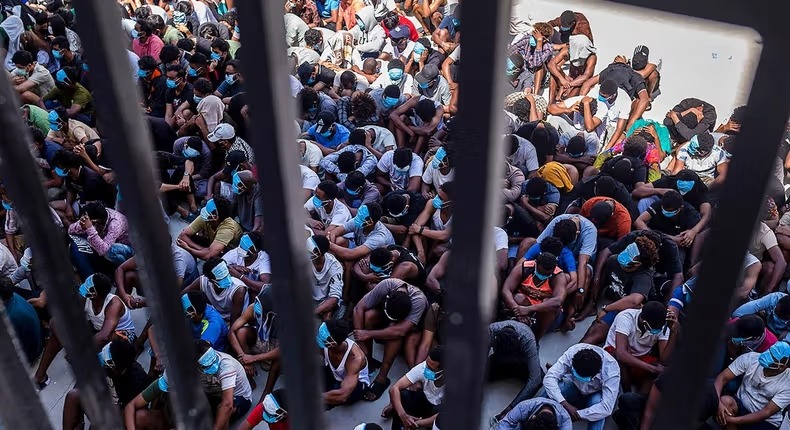
𝗛𝗼𝘄 𝗠𝘆𝗮𝗻𝗺𝗮𝗿’𝘀 𝗖𝘆𝗯𝗲𝗿-𝗦𝗹𝗮𝘃𝗲𝗿𝘆 𝗡𝗲𝘁𝘄𝗼𝗿𝗸𝘀 𝗘𝘅𝗽𝗹𝗼𝗶𝘁 𝗬𝗼𝘂𝗻𝗴 𝗔𝗳𝗿𝗶𝗰𝗮𝗻𝘀
𝗔 𝗡𝗲𝘄 𝗣𝗵𝗮𝘀𝗲 𝗼𝗳 𝗮𝗻 𝗘𝘅𝗽𝗮𝗻𝗱𝗶𝗻𝗴 𝗖𝗿𝗶𝘀𝗶𝘀
What began with the exploitation of victims in China and Taiwan, before spreading into South and Southeast Asia and India, has now reached Africa. Today, a growing number of young Africans are being trafficked into cyber-slavery compounds in Myanmar. High unemployment, lack of opportunities, and migration pressures across the African continent have created the perfect storm for traffickers to exploit, luring desperate jobseekers into a dangerous pipeline of deception and captivity.
According to a major investigative report by The Guardian UK, African youths are increasingly being deceived into what experts call “modern-day slavery.” Once recruited, they are transported to Southeast Asia, where they are confined inside guarded compounds, stripped of their freedom, and forced to carry out online scams for organized crime syndicates.
The Story of Duncan Okindo
The ordeal of 26-year-old Kenyan national Duncan Okindo illustrates the grim reality. In December, Okindo traveled to Bangkok, believing he had secured a customer service position abroad. To get the job, he paid 200,000 Kenyan shillings (£1,150) to a recruitment agency that advertised opportunities with free housing and competitive salaries.
But when he arrived, his passport was confiscated. Instead of beginning a new career, he was trafficked across the Thai border into Myanmar and held inside KK Park, a massive cybercrime hub run by Chinese criminal networks.
There, Okindo was forced to spend months operating fake social media accounts designed to trick Americans into fraudulent cryptocurrency investments. If he failed to meet daily scam targets, he was threatened with violence and subjected to beatings.
Okindo’s story is not unique—it reflects the booming industry of exploitation that has flourished in Myanmar since the 2021 military coup.
Cyber-Slavery in Myanmar: An Expanding Industry
The United Nations estimates that at least 120,000 people are currently trapped in cyber-scam compounds across Myanmar, particularly in Myawaddy, a notorious border town along the Thai frontier.
The Guardian UK reports that the number of these compounds has surged dramatically—from just 11 before the coup to more than 26 today. Many are operated by Chinese-linked syndicates who rely on trafficked workers to execute scams at an industrial scale.
Initially, most victims were Chinese and Taiwanese nationals, but the recruitment quickly expanded to include Southeast Asians and Indians. Now, as demand for skilled English-speaking labor grows, Africans—particularly Kenyans, Ugandans, Ethiopians, and South Africans—are increasingly targeted.
Why Africans Are Being Targeted
There are several reasons why young Africans have become vulnerable to this trafficking pipeline:
Language and cultural skills: Many African recruits are fluent in English, making them valuable for scams aimed at Western markets in the US and Europe.
High unemployment: In Kenya alone, 80% of the population is under 35, yet jobs remain scarce. This fuels a dangerous desire to seek work abroad.
Migration pressures: A survey cited by The Guardian found that four in ten young Kenyans have considered migrating overseas for employment. This desperation is precisely what traffickers prey upon.
Shifting criminal strategies: After Chinese authorities cracked down on scams targeting their own citizens, syndicates shifted focus outward—to Africa, where law enforcement responses are slower and desperation is high.
Recruiters exploit these conditions by advertising fake jobs on social media, through text messages, and even in rural villages. Offers promise attractive salaries, free housing, and paid flights, but the reality is forced labor, surveillance, and abuse.
Inside the Compounds: Life Under Threat
The compounds, often disguised as office parks or dormitory-style housing, are run with military-style discipline. Victims live under constant surveillance, facing severe punishments for failure.
Some are beaten or electrocuted. Others are forced to watch fellow captives tortured as a warning. Daily life revolves around running scams—everything from cryptocurrency fraud to romance scams targeting lonely individuals online.
Escape is nearly impossible, as guards and local militias patrol the compounds. Even if victims manage to flee, they risk being detained in conflict-ridden regions of Myanmar where survival is uncertain.
Government Responses and Rescue Efforts
Rescuing victims from these operations requires complex coordination between governments, militias, and local authorities.
Thailand has played a critical role, often acting as the first point of repatriation. Once victims are freed from compounds in Myanmar, they are handed over to Thai authorities in Mae Sot, where embassies negotiate their return.
In February 2024, more than 260 people from 19 countries were released from scam operations in Myawaddy and transferred into Thai custody. Among them were Africans, Asians, and even Brazilians.
Between January and April 2024, Kenya repatriated 175 citizens from Myanmar, compared to just 150 in the previous two years combined. Ethiopia, Uganda, and South Africa have also begun similar operations.
South Africa’s Department of International Relations confirmed in March that 23 South Africans had been rescued with the help of the Border Management Authority.
A Humanitarian Crisis with Global Reach
Experts warn that the trafficking of Africans into Southeast Asia marks only the latest chapter of a global industry of exploitation.
Benedikt Hofmann, the UN Office on Drugs and Crime’s regional representative, explained:
“As awareness grows in one country, traffickers simply shift their operations to another. That’s why we’re now seeing an increase in victims from Africa.”
This revolving-door system ensures that as soon as one pool of vulnerable populations is depleted or warned, another is targeted.
For victims like Okindo, freedom does not end the nightmare. Many return home carrying deep psychological scars, shame, and lingering trauma. Their dreams of opportunity abroad have been replaced by memories of captivity, violence, and betrayal.
Conclusion: A Call for Global Action
The rise of cyber-slavery in Myanmar and its spread into Africa is a humanitarian and security crisis that transcends borders. It underscores the urgent need for:
Stronger international cooperation to dismantle trafficking networks.
Awareness campaigns across vulnerable countries, warning youth against fraudulent job offers.
Support systems for survivors, including mental health care, legal aid, and reintegration programs.
For now, the cycle continues—criminal syndicates thrive on desperation, and victims from Africa to Asia are caught in their web. Unless global action is taken, the tragedy of cyber-slavery will only expand further, ensnaring more innocent lives.
Related posts:
 UN Special Rapporteur Report on Myanmar Rights
UN Special Rapporteur Report on Myanmar Rights
 Myanmar junta fortifies Sittwe as AA nears Rakhine
Myanmar junta fortifies Sittwe as AA nears Rakhine
 ASEAN to Decide on Myanmar Election Observers in 2025
ASEAN to Decide on Myanmar Election Observers in 2025
 East Timor’s ASEAN Gamble: Mending Ties with Myanmar Junta
East Timor’s ASEAN Gamble: Mending Ties with Myanmar Junta
 China Executes 5 from Myanmar Scam Gang in Fraud Crackdown
China Executes 5 from Myanmar Scam Gang in Fraud Crackdown
 Myanmar Considers Direct Yuan Investment to Boost Chinese Business Engagement
Myanmar Considers Direct Yuan Investment to Boost Chinese Business Engagement
